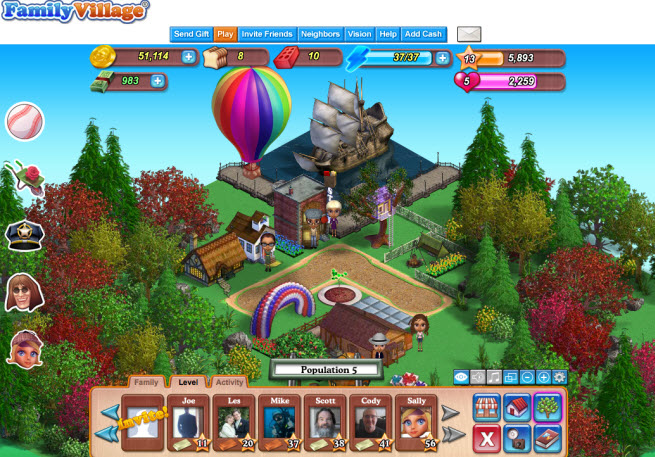Funium’s Family Village game is one more new city-building game on Facebook. Against Zynga’s CityVille and Electronic Arts’ SimCity Social, a small company like Funium might seem like a nonstarter. But its unique twist on family history and unusual method for keeping players engaged just might prove addictive for users. Funium’s founder, Jeff Wells, hopes that the game will bring some disruptive innovation to the social game genre that has become stale lately.
In Family Village, you create characters, build a town, and then populate it with more people. But the twist is that those people are actually members of your own family tree. If you play enough, Funium will reward you with information about your ancestors that it has dug up through its own research into genealogical data. You can then decorate the “family museums” of your characters and invite friends to view them. The more you find out about your ancestors through historical documents, the more you want to build out your own virtual community.
“This is a social game with real-world value,” said Wells, the chief executive of Funium, in an interview with GamesBeat. “We hope it will be disruptive in the industry. We think we have the secret sauce to make the game last longer and become more fun and exciting in the process. It’s like we are gamifying genealogy. ”
AI Weekly
The must-read newsletter for AI and Big Data industry written by Khari Johnson, Kyle Wiggers, and Seth Colaner.
Included with VentureBeat Insider and VentureBeat VIP memberships.
 Family Village is the brainchild of Wells, a “product enhancement specialist” in Provo, Utah. His job is to figure out how to enhance the value or usage of a product, like when he got people to use their American Express cards more by forming deals with insurance companies that give bonus rewards for using American Express.
Family Village is the brainchild of Wells, a “product enhancement specialist” in Provo, Utah. His job is to figure out how to enhance the value or usage of a product, like when he got people to use their American Express cards more by forming deals with insurance companies that give bonus rewards for using American Express.
“I love family history, and I spend hours doing it at night,” said Wells. “It is a grueling process, but it is thrilling. I thought we could make it into a game.”
The game has been in beta testing since April 2011, and it has more than 30,000 users, despite little advertising. The online community that you create can be set in a time such as the 1800s, when your ancestors lived. You can set them up in the clothes of the era and personalize the avatars so they actually look like your ancestors. You can create multiple villages across different time periods, collaborate on a family tree with other family members or friends, and access more historical documents via search.
The business model is novel. Rather than buying traditional virtual goods in the free-to-play game, you purchase historical documents for 50 cents or a dollar.
Users can also upload their own family documents and pictures or write fun stories about family members. The breadth of tasks explains why an average single-session playtime is 14 minutes, or triple the industry average. The game becomes more valuable to the player over time because of the increased chance of discovering new family history research and unknown family members.
The game will likely have appeal in Europe and China, where family history research is a popular cultural interest. But it may not be as useful in countries where documents have not been translated into English or kept at all, Wells acknowledged.
Wells said his founding team shares deep history in genealogy, having been involved in the Ancestry.com, GeneTree, and the Sorenson Molecular Genealogy Foundation. In the game, players build businesses and houses and “immigrate” family members into the community. They assign jobs based on the time period in which the family member lived. Then Family Village matches the data to real-world documents about the living users and their deceased family relatives. These sources include newspaper articles, census records, and other documents. The objective is to understand and protect your family legacy. You start with a seedling, and over time you grow your family tree.
“It creates connections and discussion between family members,” said Wells.
Jim Sorenson, the lead investor in Ancestry.com, met Wells about four years ago and introduced him to cofounder Paul Allen. Sorenson’s Family Odyssey firm and other angel investors put $3 million into Funium. The company was founded in 2010 and has under 50 employees.
VentureBeat's mission is to be a digital town square for technical decision-makers to gain knowledge about transformative enterprise technology and transact. Learn More
